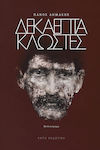Mystical, thrilling, romantic, and terrifying. This novel is a precursor to the genre of cosmic horror stories in which a great admirer of Blackwood, H. P. Lovecraft, specialized.
“He knew that many curious people placed ads in newspapers, as well as that many curious people wrote letters to them, and Spinney—as those who loved him called him—was a diligent student and read columns known as ‘Agony’ and ‘Help Wanted.’ At some point, when he reached the age of twenty-eight and was without a job, the threads of the following incident wove into the pattern of his life and ‘led to something’ that might well provoke wonder and surprise.
The advertisement that was ultimately the bait read:
WANTED, by a retired clergyman, an assistant secretary with courage and imagination. Tenor voice and some knowledge of the Hebrew language required; free of obligations; kind. Apply for the job to Philip Scale.”
The claim that music shares a mysterious relationship with the human soul is not new. For thousands of years, since our distant ancestors began creating pleasant sounds with whatever rudimentary tools they could use, music has been an important part of ritual, ceremony, and spiritual life. In The Human Chord, the famous master of the supernatural Algernon Blackwood elevates this claim—with fascinating and thought-provoking conclusions.
Literary, enchanting, and impressive, The Human Chord is a true masterpiece. As the author himself writes at one point, “it strains the possibilities of faith and the resources of imagination,” and yes, many of the things Blackwood asks us to accept as possible in this horror novel seem rather somewhat excessive at first glance. But such is the descriptive ability of the author and so clear are his explanations that even his most outrageous inventions become completely believable.
As the Daily Telegraph wrote at the time: “The author had, one might say, an astonishing idea and executed it with all the zeal and talent that he possesses…”












